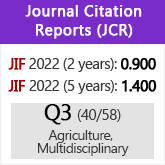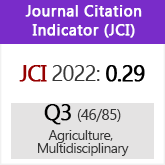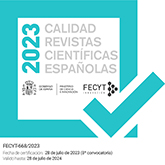What makes a citrus farmer go organic? Empirical evidence from Spanish citrus farming
Abstract
Organic farming is increasing its share of total world food output and receiving grow-ing support from policymakers concerned with agricultural sustainability issues. This paper studies the characteristics of citrus farmers in the Spanish region of Valencia that affect their probability of becoming organic farmers. A fair understanding of these characteristics may help policymakers improve the design of agricultural policies aimed at supporting organic citrus practices. As regards the methodology, a probit model is estimated with information from a sample of conventional and organic citrus farmers obtained from a survey designed for a larger research project aimed at analysing Valencian citrus farming. Our main finding is that university education and agricultural professional training both increase the probability of becoming an organic farmer. Conversely, older farmers, farmers selling their production to foreign markets and those with larger farms and/or managing family farms are less likely to adopt organic citrus farming. The main policy implication is that, in order to support organic citrus production, more attention needs to be paid to improving farmers’ technical training and education.Downloads
References
Armesto-López XA, 2008. Organic farming in Spain – Two case studies: Catalonia and Gali-cia. J Sustain Agr 31(4): 29-55.
http://dx.doi.org/10.1300/J064v31n04_04
Becker B, 1997. Sustainability assessment: a review of values, concepts and methodological approaches. Issues in agriculture 10. CGIAR-World Bank, Washington.
Bliss CI, 1934a. The method of probits. Science 79: 38-39.
http://dx.doi.org/10.1126/science.79.2037.38
PMid:17813446
Bliss CI, 1934b. The method of probits – A correction. Science 79: 409-410.
http://dx.doi.org/10.1126/science.79.2053.409
PMid:17792220
Burton M, Rigby D, Young T, 1999. Analysis of the determinants of adoption of organic hor-ticultural techniques in the UK. J Agr Econ 50(1): 47-63.
http://dx.doi.org/10.1111/j.1477-9552.1999.tb00794.x
Cameron AC, Trivedi PK, 2010. Microeconometrics using Stata. Stata Press, College Station, TX, USA.
Crosson PR, 1999. Sustainable agriculture. In: The RFF reader in environmental and resource management. Resources for the future (Oates WE, ed.). Washington, DC, pp: 257-262.
PMid:10464735
Domínguez-Gento A, 2007. Estudi d'un cas de conversió en la citricultura ecològica valenci-ana. CAECV Informa 5: 3-6 and 6: 6-9. [In Catalan].
Domínguez-Gento A, 2008. La citricultura ecológica. Servicio de Asesoramiento a los Agri-cultores y Ganaderos. Dirección General de Agricultura Ecológica. Consejería de Agri-cultura y Pesca de la Junta de Andalucía. Seville, Spain. [In Spanish].
Gómez-Limón JA, Picazo-Tadeo AJ, Reig-Martínez E, 2012. Eco-efficiency assessment of olive farms in Andalusia. Land Use Policy 29(2): 395-406.
http://dx.doi.org/10.1016/j.landusepol.2011.08.004
Hansen JW, 1996. Is agricultural sustainability a useful concept? Agr Syst 50: 117-143.
http://dx.doi.org/10.1016/0308-521X(95)00011-S
Howe ChW, 1997. Dimensions of sustainability: Geographical, temporal, institutional, and psychological. Land Econ 73(4): 597-607.
http://dx.doi.org/10.2307/3147248
Ingram J, 2008. Agronomist–farmer knowledge encounters: an analysis of knowledge ex-change in the context of best management practices in England. Agr Hum Values 25(3): 405-418.
http://dx.doi.org/10.1007/s10460-008-9134-0
Kaufmann P, Zemeckis R, Skulskis V, Kairyte E, Stagl S, 2011. The diffusion of organic farming in Lithuania. J Sustain Agr 35: 522-549.
http://dx.doi.org/10.1080/10440046.2011.579838
Koesling M, Flaten O, Lien G, 2008. Factors influencing the conversion to organic farming in Norway. Int J Agr Resour Gov Ecology 7(1/2): 78-95.
http://dx.doi.org/10.1504/IJARGE.2008.016981
Landis, J, Koch, G, 1977. The measurement of observer agreement for categorical data. Bio-metrics 33: 159-174.
http://dx.doi.org/10.2307/2529310
PMid:843571
Läpple D, Van Rensburg T, 2011. Adoption of organic farming: Are there differences be-tween early and late adoption? Ecol Econ 70: 1406-1414.
http://dx.doi.org/10.1016/j.ecolecon.2011.03.002
Lynam JK, Herdt RW, 1989. Sense and sustainability: sustainability as an objective in inter-national agricultural research. Agr Econ 3(4): 381-398.
http://dx.doi.org/10.1016/0169-5150(89)90010-8
MARM, 2010. Estadísticas 2010 de agricultura ecológica, España. Ministerio de Medio Am-biente y Medio Rural y Marino, Madrid. [In Spanish].
Mzoughi N, 2011. Farmers adoption of integrated crop protection and organic farming: Do moral and social concerns matter? Ecol Econ 70: 1536-1545.
http://dx.doi.org/10.1016/j.ecolecon.2011.03.016
Padel S, 2001. Conversion to organic farming: A typical example of the diffusion of an inno-vation? Sociol Ruralis 41(1): 41-61.
http://dx.doi.org/10.1111/1467-9523.00169
Padel S, 2008. Values of organic producers converting at different times: results of a focus group study in five European countries. Int J Agr Resour Gov Ecology 7(1/2): 63-77.
http://dx.doi.org/10.1504/IJARGE.2008.016980
Parra-López C, De Haro-Giménez T, Calatrava-Requena J, 2007. Diffusion and adoption of organic farming in the Southern Spanish olives groves. J Sustain Agr 30(1): 105-151.
http://dx.doi.org/10.1300/J064v30n01_09
Peris EM, Juliá JF, 2006. Production costs of the organic Clementine crop in the region of Valencia (Spain). Span J Agric Res 4(1): 17-25.
Peris EM, Juliá JF, Balasch S, 2005. Estudio de las diferencias de costes de producción del cultivo de naranjo convencional, ecológico e integrado en la Comunidad Valenciana mediante el análisis factorial discriminante. Econ Agrar Recurs Nat 5(10): 69-87. [In Spanish].
Picazo-Tadeo AJ, Reig-Martínez E, 2005. Calculating shadow wages for family labour in agriculture: An analysis for Spanish citrus fruit farms. Cahiers d'Economie et Sociologie Rurales 75: 6-20.
Picazo-Tadeo AJ, Reig-Martínez E, 2006. Outsourcing and efficiency: the case of Spanish citrus farming. Agr Econ 35(2): 213-222.
http://dx.doi.org/10.1111/j.1574-0862.2006.00154.x
Picazo-Tadeo AJ, Reig-Martínez E, Gómez-Limón JA, 2011. Assessing farming eco-efficiency: A data envelopment analysis approach. J Environ Manage 92(4): 1154-1164.
http://dx.doi.org/10.1016/j.jenvman.2010.11.025
PMid:21193265
Picazo-Tadeo AJ, Beltrán-Esteve M, Gómez-Limón JA, 2012. Assessing eco-efficiency with directional distance functions. Eur J Oper Res 220: 798-809.
http://dx.doi.org/10.1016/j.ejor.2012.02.025
Porcuna JL, Gaude MI, Castejón P, Domínguez A, 2010. Guía de agricultura ecológica de cítricos. Proyecto Mayas. Federación de Cooperativas Agrarias de la Comunidad Va-lenciana, Valencia, Spain. [In Spanish].
Pretty J, 2008. Agricultural sustainability: concepts, principles and evidence. Philos Trans R Soc B Biol Sci 363: 447-465.
http://dx.doi.org/10.1098/rstb.2007.2163
PMid:17652074 PMCid:2610163
Rao NH, Rogers PP, 2006. Assessment of agricultural sustainability. Curr Sci 91(4): 439-448.
Rigby D, Young T, Burton M, 2001. The development and prospects for organic farming in the UK. Food Policy 26(6): 599-613.
http://dx.doi.org/10.1016/S0306-9192(01)00023-9
Rogers EM, 1983. Diffusion of innovation. The Free Press, NY.
Stolze M, Lampkin N, 2009. Policy for organic farming: rationale and concepts. Food Policy 34: 237-244.
http://dx.doi.org/10.1016/j.foodpol.2009.03.005
Wheeler SA, 2011. What influences agricultural professionals' views towards organic agricul-ture? Ecol Econ 65: 145-154.
http://dx.doi.org/10.1016/j.ecolecon.2007.05.014
WCED, 1987. Our common future. World Commission on Environment and Development, Oxford University Press. Oxford, UK.
© CSIC. Manuscripts published in both the printed and online versions of this Journal are the property of Consejo Superior de Investigaciones Científicas, and quoting this source is a requirement for any partial or full reproduction.
All contents of this electronic edition, except where otherwise noted, are distributed under a “Creative Commons Attribution 4.0 International” (CC BY 4.0) License. You may read here the basic information and the legal text of the license. The indication of the CC BY 4.0 License must be expressly stated in this way when necessary.
Self-archiving in repositories, personal webpages or similar, of any version other than the published by the Editor, is not allowed.















